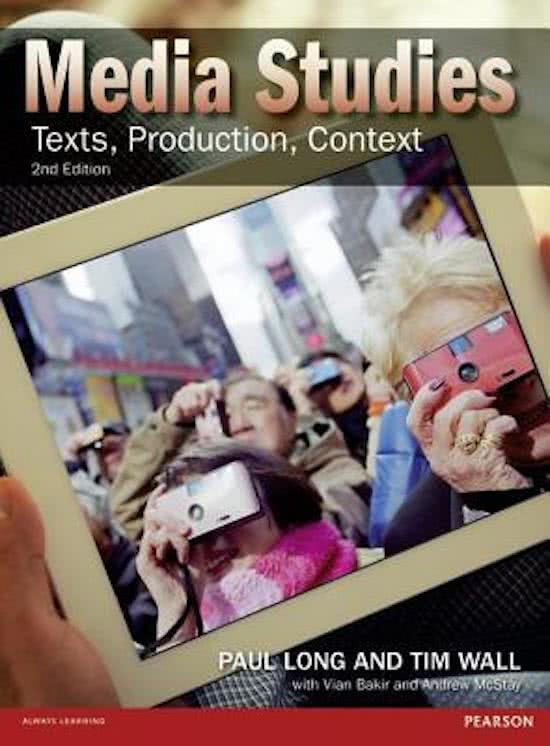Media Studies: Text, Production and context, Paul Long & Tim Wall (2012).
Book Summary for the course ‘Introduction to Media Studies II’
Table of Contents
Chapter 7: Media production in a global age p.234- 270....................................................1
Chapter 6: Media regulation and policy (p. 204-231)..........................................................7
5: The business of Media (p. 166-202, excluding p. 192-197).............................................11
Chapter 8: Producing audiences: what do media do to people?........................................17
Chapter 9: Investigating audiences: what do people do with media? (p. 300-340)............20
,Chapter 7: Media production in a global age p.234- 270.
Global -> media monied media conglomerates with global presence, e.g. Time Warner and
Walt Disney, Google, Facebook, or the internet.
Rich and highly educated have more access to the internet at home than the poor and the less
educated = the Digital Divide.
News production = first global media enterprise.
Connecting local with global and similar in style worldwide, because of
commodification of news, exchangeable between news outlets around the world and
to consumers
Important news agencies dominate global media.
Historically: Agence France Press (AFP), Deutsche Presse Agentur (DPA), Reuters
(UK). Later in US: Associated Press (AP), United Press International (UPI), United
Press Associations (UPA).
These news agencies started to supply national newspapers with stories from across the
world, information became a commodity, presented in a neutral style to be saleable to editors
of different political persuasion to do with what they would.
a journalism of information: stress is not on opinion but on facticity
importance of the speed of delivery, helped by telegraph
facticity and speed important in terms of developing lobal standards for news.
European cartel of news agencies collapsed in 1934, when the UPA refused to join them, and
from that time the major news agencies competed with each other, with USA becoming the
major player.
Rise of television news: North American dominance, but British role.
Concentration of international TV newsgathering into hands of a few organizations,
resulted in the same TV stories being broadcast worldwide. Cheaper to buy such
footage than to create it independently.
Rise of the internet in 1990 new dominant form of news gathering.
Collaborative journalism, with user-generated content.
Search engine companies dominant in determining what information is available and
how we can reach it.
New global media environments
Explosion of content, must be classified in order to be accessible, and classification
inevitably involves selection. Classification done by search engines.
Issues of credibility: automation means that it cannot detect disinformation and
propaganda.
Expands access to diverse viewpoints on any issue.
Problems:
Ordinary search engines tend to give a much higher profile to commercial sites due to
the latter’s marketing and technical savviness -> increase visibility of non-commercial
sites and content?
English is the lingua Franca of the web, ad those who are not searching in English are
disadvantaged. Search engines were not geared up to non-English languages. ->
1
, situation is changing because of emerging non-English speaking markets such as
Russia and China.
All news aggregator websites rely on the online version of traditional media outlets
for content, these news search engines are ultimately dependent on the selection
processes made by the normal institutional gatekeepers of news. Also, editorial
process: human editors sift the aggregated news.
Protocol and rules for global internet governance and management were shaped by USA’s
dominance, and decision to liberalize, privatize and commercialize the new medium.
Regulating global media
Can a global medium like the internet be regulated effectively? If it can, where does the
balance lie between being able freely to access and transmit information and securing our
rights to privacy, security and intellectual property?
Increasing problematic question in the age of new terrorism.
To gain access to the internet, we first need a subscription to an internet service provider
(ISP).
Should these be private companies, or national governments and international
organization?
Evading nationally specific cultural norms and regulations
The internet makes it virtually impossible to regulate and censor content.
Censorship efforts are continued by offended governments
Internet regulation is problematic when oppressive or paranoid governments use the pretext
of protecting citizens from subversive ideas or defending national security or cohesion to
deny them access to the internet.
Information production and distribution are dominated by global media conglomerates from a
limited number of countries, or dominated by regulation emanating from specific countries ->
likely to colour the points of view with which that information is selected, presented,
distributed and regulated.
Global entertainment
Global dominance in entertainment
E.g. in movie industry: US passed an act that allowed US film association to set or fix
the price of exports, imposing conditions on overseas sales that were not allowed on
the home market, so making foreign sales a more important part of the film industry’s
revenue. Part of US government’s recognition that Hollywood was an important
driver of the nation’s ideals and ideologies, spreading the American way of life.
Globalization, according to Giddens = the intensification of world-wide social relations,
which link distinct localities in such a way that local happenings are shaped by events
occurring many miles away and vice versa.
Media globalization refers to phenomena like the worldwide distribution of identical
programme content or globally interchangeable programme formats, and the
distribution of special interest information targeting a globally dispersed minority
audience.
2






